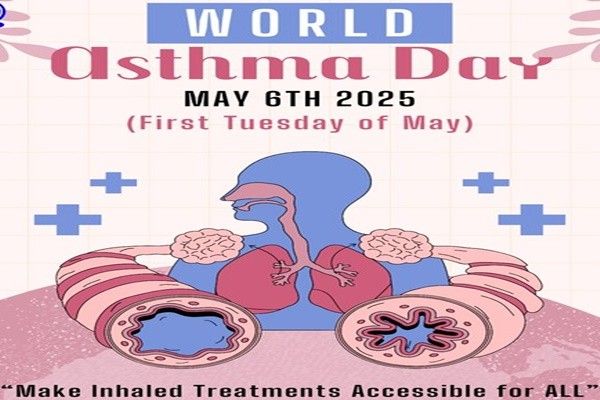
Raising Global Awareness on Asthma
On May 6, 2025, the world observed World Asthma Day under the theme “Make Inhaled Treatments Accessible for ALL,” as designated by the Global Initiative for Asthma (GINA). This annual event aims to raise awareness about asthma, a chronic respiratory condition affecting over 260 million people worldwide. Despite the availability of effective treatments, asthma remains a leading cause of morbidity and mortality, particularly in low- and middle-income countries where access to essential medications is limited.
The Importance of Inhaled Corticosteroids
Inhaled corticosteroids (ICS) are the cornerstone of asthma management, effectively controlling inflammation and preventing attacks. GINA emphasizes the necessity of ensuring that all individuals with asthma have access to these essential medications. Unfortunately, in many regions, the high cost and limited availability of ICS inhalers hinder proper disease management, leading to preventable hospitalizations and deaths. The call to action urges healthcare professionals to prescribe evidence-based, ICS-containing medications to all asthma patients to reduce the global burden of the disease.
Challenges in Low- and Middle-Income Countries
The disparity in asthma care is particularly evident in low- and middle-income countries, where 96% of global asthma deaths occur. Factors such as the unavailability of ICS inhalers, high medication costs, and inadequate healthcare infrastructure contribute to the poor management of asthma in these regions. Even in high-income countries, financial barriers can limit access to essential medications, resulting in poorly controlled asthma and preventable deaths. The ongoing efforts aim to address these inequities and ensure that effective asthma treatments are accessible to all individuals, regardless of their economic status.
The Role of Education in Asthma Management
Education plays a pivotal role in empowering individuals with asthma to manage their condition effectively. The World Health Organization (WHO) highlights the importance of providing comprehensive asthma education, including information on the disease, medication usage, trigger avoidance, and the development of personalized asthma action plans. Such education can lead to improved medication adherence, reduced emergency visits, and better overall health outcomes. Healthcare providers, schools, and community organizations are encouraged to disseminate accurate information and support individuals in self-managing their asthma.
The Need for Policy and Systemic Change
To achieve the goal of making inhaled treatments accessible for all, systemic changes are necessary. Policymakers, governments, and the pharmaceutical industry must collaborate to increase the availability and affordability of ICS inhalers. This includes addressing regulatory barriers, promoting the production of generic medications, and implementing policies that prioritize asthma care in national health agendas. By fostering an environment that supports equitable access to asthma treatments, the global community can work towards reducing the preventable burden of asthma.
Conclusion
World Asthma Day 2025 serves as a reminder of the ongoing challenges faced by individuals with asthma, particularly those in underserved regions. The theme “Make Inhaled Treatments Accessible for ALL” underscores the urgent need for global action to ensure that effective asthma management is within reach for everyone. Through increased awareness, education, and systemic change, the vision of accessible inhaled treatments for all individuals with asthma can become a reality, leading to improved health outcomes and a reduction in asthma-related morbidity and mortality worldwide.




































Leave a Reply